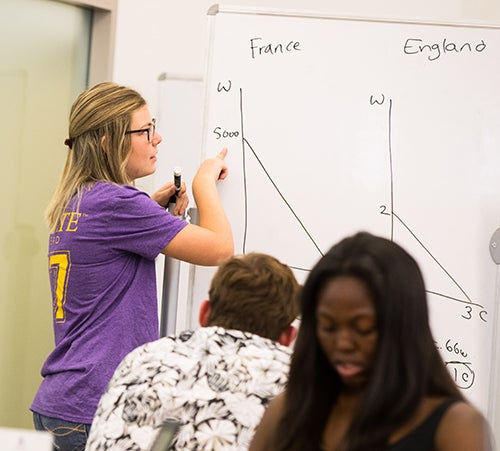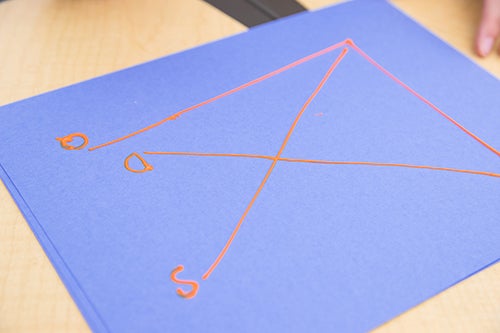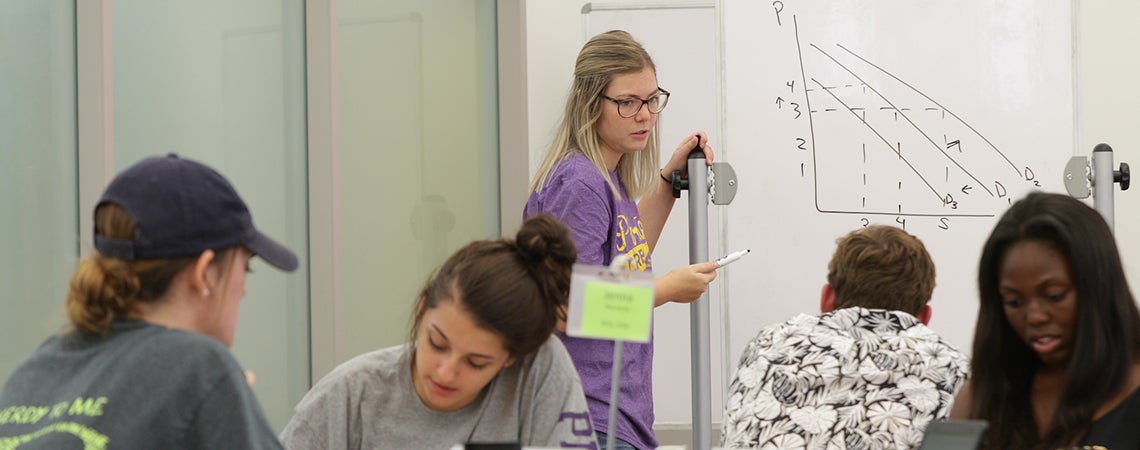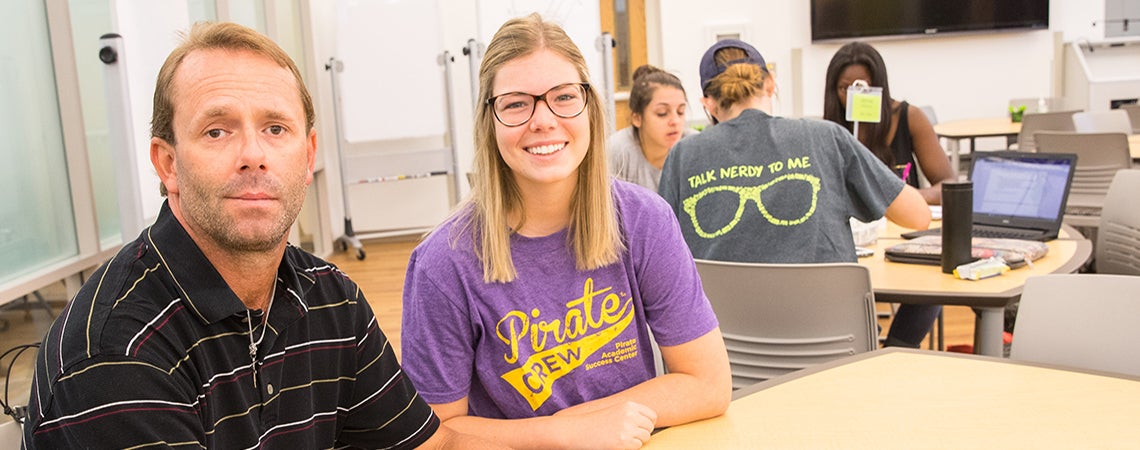PAINT AND NUMBERS
Innovation abounds at PASC
How do you study a graph if you can’t see it?
That’s the problem that faced East Carolina University students Lee Brame and Regan Simmer, his tutor at the Pirate Academic Success Center. The solution, it turned out, was puffy paint.
Brame lost his eyesight due to a hereditary disorder called retinitis pigmentosis.
“They told me at 13 I’d be blind at 20,” he said. “But it affects everybody differently, and I made it to 37 and a half.”
With 19 years in industrial construction under his belt, including working on the ECU Student Recreation Center in the mid-’90s, Brame returned to school to prepare for a new career, starting at Beaufort County Community College before transferring to ECU. He has help in the form of auditory programs, aides and a mobility instructor to navigate the classrooms and coursework. He also knew he’d need help in the form of tutoring.

Simmer graphs economics concepts on a whiteboard at the Pirate Academic Success Center.
“I came (to the PASC) as soon as I got to ECU,” he said. “I didn’t want to get behind on anything.”
The challenge was his economics class — many of the concepts were very visual, relying on graphs.
“The first couple of lessons we struggled with the graphs,” Simmer said. “Then he suggested the puffy paint, and I knew that was exactly what we needed. From the first time we did it, it really clicked. He was able to feel it, so it wasn’t just me explaining it.”
Simmer would prepare the charts ahead of time so the paint could dry, and they helped give Brame a better mental image of concepts like supply and demand. During one session they were even joined by the course instructor so he could also use the charts when meeting with Brame.
“Once Regan drew the lines with puffy paint, I could put my hands on the chart and feel the different textures,” Brame said. “I was able to understand the questions because I could remember what the graph looked like. It helped me tremendously.”
Brame credits Simmer and the PASC for helping him pass that economics class. It’s just one example of how the tutoring center is geared toward creative approaches to learning, said PASC director Elizabeth Coghill.
“It’s all part of this push within the center to make sure that materials are represented in very different ways,” she said. “We’re not a replacement for lecture, we are a supplement. What that means for our tutors is training them in how to use technology and be creative about the way they present materials.”
The PASC is a busy place — last year it served almost 7,000 individual students who logged more than 45,000 service visits. The space is designed to foster creative use of technology, including whiteboards and tablets that save notes as a PDF for the students to take home. Through the College Star program, the PASC is working to ensure that the tutors and students take full advantage of that technology.
“College Star is focused on learning differences. … Every student who walks in the door has some preferences, and has some ways that materials need to be presented to them for it to be that ‘ah ha’ moment,” Coghill said. “What we’re working to do is keep those tools and resources in the hands of our tutors, and in training sessions open their eyes to what that could look like.”

Simmer and Brame’s puffy paint graphs are just one example of how each student receives tutoring tailored to their individual learning needs.
In addition to in-person tutoring, the PASC is increasing its digital presence, offering bonus video content for 13 science courses. If a student can’t make it to a particular workshop, they may be able to watch it from home — as many times as they need to until the material clicks.
“Our tutoring appointments span from 9 in the morning until 9 at night, and the space is being pushed to its limits during the school year,” Coghill said. “We keep expanding the options so that students can get the help they need.”
Simmer said for the tutors, it’s about figuring out what approaches work best for each individual student.
“I’m very into having people write stuff down themselves, because I think that’s what helps you remember it. But I try to cater to everybody’s learning style,” she said. “I’ll try to explain things in depth, and if they have questions I’ll go over it more. But I definitely think, especially with econ, seeing the graphs, and in Lee’s case feeling them, is what it’s all about.”
PASC services are free for ECU students and include face-to-face and digital tutoring, academic mentoring, study skills workshops and support for special student populations such as first-generation, military and transfer students. Last year the PASC had 286 crew members, including both paid and volunteer tutors.
Coghill said the center, now in its ninth year, is unique in its scope and approach, and serves as a model for other tutoring centers. “We often have folks from other campuses visit us to learn how to use the technology or to expose them to a vision that they haven’t seen yet.”
For more information, visit http://www.ecu.edu/cs-acad/aa/PirateAcademicSuccessCenter/index.cfm

The Pirate Academic Success Center served approximately 7,000 students during the 2016-17 academic year, logging more than 45,000 service visits.
